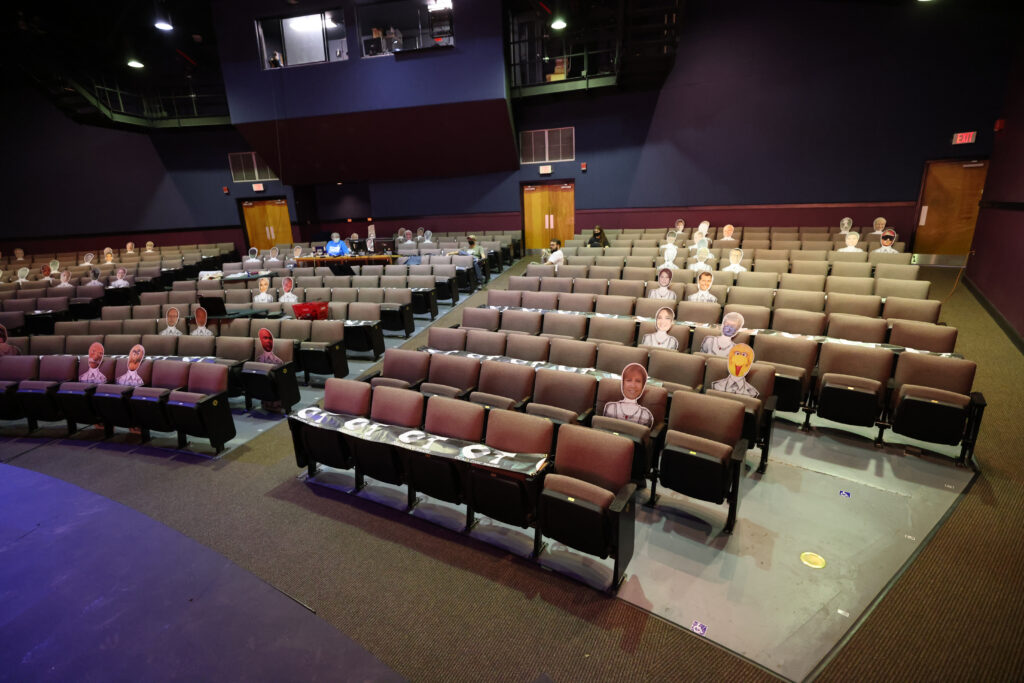Pandemic grants help the show go on

Less cutouts to provide for social distancing are shown in the audience at the Ocala Civic Theatre in Ocala, Fla. on Monday, April 5, 2021. The play about the delightfully dysfunctional Magrath family of small-town Hazlehurst, MS is live on stage from April 8 to May 2, 2021. [Bruce Ackerman/Ocala Gazette] 2021.

Cutouts are shown in the audience at the Ocala Civic Theatre in Ocala in April. The cutouts were a way to help raise money as theatre audiences stayed away during the pandemic. [Bruce Ackerman/Ocala Gazette]
While the grant program’s rollout took months and the enrollment process was buggy at first, the grants, which were targeted toward entertainment venues affected by the COVID-19 pandemic, will keep the curtain up.
“You can only do so much fundraising,” said Miller, the business and development director at OCT. “I think we were smart enough in our finances where we were okay with things with our savings and endowments and things like that. That sustained us for a little while. But it would have been a struggle without receiving the money.”
It’s a similar story for Matthew Wardell, chief executive officer and artistic director of the Reilly Arts Center.
“Instead of 18 employees,” said Wardell, “we’d probably be down to about six or seven. It would have been a much different situation if we had not received this relief.”
But for a while, there was some high drama.
The Shuttered Venue Operators (SVO) Grant Program, as it is known, was first established on Dec. 27, but it didn’t roll out until April 8.
Miller applied the first day—or tried to—since the program’s application portal was beset with technology glitches, opening and closing within hours of its debut.
“We just stayed at it,” Miller said. “Throughout the day, I signed on, if it was up and running, and just kept at it. My goodness, there were so many people that needed this funding.”
The program includes more than $16 billion in grants for live venue operators, promoters, theatrical producers and other similar operators affected by COVID-19. The program is administered by the Small Business Administration Office of Disaster Assistance.
According to the SBA, 10,330 applications were submitted in the first week alone (another 12,000 applications were started but not completed.)
The majority of applicants were from “live venue operators or promoters,” followed by performing arts organizations and movie theaters.
Miller didn’t know what to expect from the application process but was relieved that it worked out as well as it did.
“You hear so many different things,” said Miller. “And as soon as someone says, you know, ‘government funding.’ You expect long delays, but we were pretty satisfied with the turnaround time and the entire process.”
Wardell got his first notification that there was some movement happening with the Reilly’s relief application around mid-June. It had been under review since April 26.
“We didn’t hear anything at all until right before the July 4 holiday. That’s when we were notified that we were approved,” he said. “And we got the money pretty quickly after that, about a week or so later.”
The Reilly received $703,000 in its first round of relief. A second round of supplemental relief is currently under review. Wardell said he should know within the next two weeks when the second round of relief money will be available. It’s estimated at about $392,000.
With its SVOG money, the Reilly can pay its employees for almost a year. If the supplemental funds come through, that’s another six months, Wardell said.
The Reilly’s gross revenue in 2019 was $4.6 million. In 2020, it sank to $1.3 million. Earned revenue in 2019 was $1.75 million. In 2020, it was $650,000.
“I think those numbers help give an idea of the effect the pandemic had on our earned revenue,” Wardell said.
The Reilly also received about $150,000 in PPP loans, plus money from the county as part of the CARES Act through the Ocala Marion County Community Foundation.
Still, the time it took to get the SVOG grant was longer than Wardell had anticipated.
“We never thought it would be July of 2021 before we’d get that SVOG money,” said Wardell. “That bill was passed under Trump back in like December. So, we felt for sure, we were going to get it by March or April. But it was another three months from there, so, that was getting a little trying. I was in a bad mood for about seven weeks. We were literally counting our pay periods.”
According to Miller, the OCT put its relief money towards payroll and building upkeep.
“Of course, when it rains, it pours,” said Miller. “Our portico needed to be fixed, because it was falling, and we didn’t want it to fall on somebody. So that was an unexpected expense, and a huge amount went towards repairing it in order to continue operating.”
Funds can be used for specific expenses, such as payroll costs, rent payments, utility payments and scheduled mortgage payments, to name a few.
Funds cannot be used to buy real estate, make investments or loans, or to make political contributions.
Venues like the Ocala Civic Theatre and the Reilly Arts Center are stalwart institutions for the people of Marion County, said Miller, and she believes that they need to stay afloat.
“People just need to escape from the world for two hours at a time sometimes—that’s why live theater is here,” explained Miller. “We’ve been very, very fortunate to be able to continue to do that for Ocala.”





